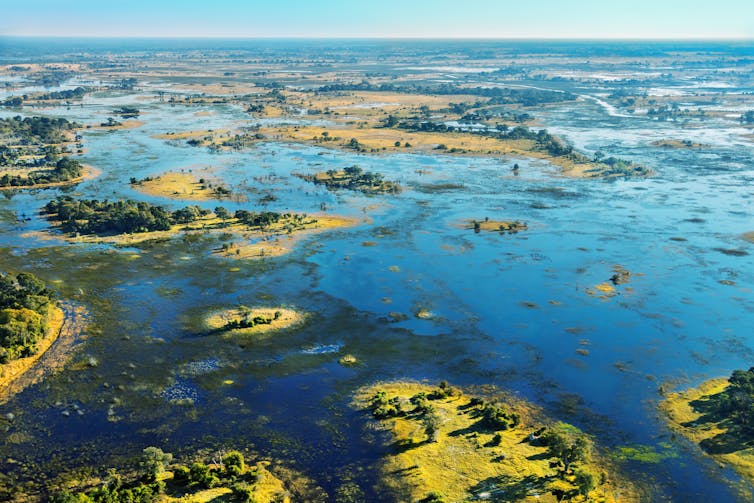INSTITUTE OF HEALTH SCIENCES: ADMISSION FOR ACADEMIC YEAR 2018/2019(BASIC PROGRAMS)
The Institute of Health Sciences Coordinating Unit invite applications from candidates wishing to study for the following programmes.
Candidates should hold a minimum of a COSC/BGCSE or its equivalent with a minimum grade as specified under each program.
1. GENERAL NURSING –
ALL HEALTH TRAINING INSTITUTIONS EXCEPT BAMALETE LUTHERAN SCHOOL OF NURSING
MINIMUM ENTRANCE QUALIFICATIONS
a) Option1: A grade D or better in English, a grade C or better in Mathematics, Biology and one other science subject (Chemistry, Physics and Physical Science)
b) Option 2: A grade D or better in English, a grade C or better in Mathematics and Double Award Science or
c) Option 3: A grade D or better in English, a grade C or better in Mathematics and Combined Science plus Additional Combined Science/Physi-chem, Bio-chem
2. ENVIRONMENTAL HEALTH – LOBATSE
MINIMUM ENTRANCE QUALIFICATIONS
A grade D or better in English, and a minimum of grade C in Mathematics, Biology, Physics, Chemistry; OR grade D or better in English and a minimum of grade C in Mathematics and grade BB or better in Double Award Sciences; OR grade D or better in English and a grade C or better in Mathematics, Biology and Physic-chem.
Mature Entry Scheme
Applicants upgrading from Health Assistants to Higher Diploma in Environmental Health shall be required to have obtained at least one of the following:
• Botswana General Certificate of Secondary Education (BGCSE) or its equivalent.
• Certificate in Environmental or Public Health with at least 5 years working experience.
Applicants who perform at 60 % pass in the aptitude test will be admitted to the third semester
3. HEALTH EDUCATION – SEROWE
MINIMUM ENTRANCE QUALIFICATIONS
A grade C or better in English, Mathematics, Biology, and Physics or Chemistry; OR grade C or better in English, Mathematics and Double Science Award
4. MEDICAL LABORATORY
TECHNOLOGY – GABORONE
MINIMUM ENTRANCE QUALIFICATIONS
a) Option 1: A grade D or better in English and Mathematics, a minimum of grade C in Chemistry, Biology and Physics
b) Option 2: A minimum of grade BB or better in Double Science Award in addition to English and Mathematics requirements above.
5. PHARMACY TECHNOLOGY – GABORONE
MINIMUM ENTRANCE QUALIFICATIONS
A grade D or better in English and a minimum of grade C in Mathematics, Chemistry, Biology and Physics; OR a minimum of grade BB or better in Double Science Award in addition to English and Mathematics requirements above.
APPLICATIONS SHOULD BE DIRECTED TO:
The Academic Registrar, Institute of Health Sciences – of either of the following institutions:
• P O Box 985 GABORONE
• P O Box 267 FRANCISTOWN
• P O Box 309 LOBATSE
• P O Box 684 MOLEPOLOLE
• P O Box 128 SEROWE
• Kanye SDA College of Nursing, PO Box 11 KANYE
NB:
a) All applications should be accompanied by certified copies of Omang/ID, BGCSE/Equivalent certificates, two references/testimonials and an application fee of P50(P75 applicants outside SADC)
b) Applications which do not meet the above requirement will not be considered
c) Meeting the minimum requirements does not guarantee admission into any of these institutions.
d) Citizen applicants not on any government sponsorship are advised to apply for sponsorship with the Department of Tertiary Education Funding (DTEF) in the Ministry of Tertiary Education, Research and Science & Technology.
e) International applicants should verify their academic certificates with Botswana Qualification authority (BQA).
f) All admitted candidates will be expected to undergo medical examination
g) Application forms are obtainable at institutions of choice.
Only short listed candidates will be responded to.
The closing date for all applications is 13/04/2018.
For further information contact: Institute of Health Science Coordination Unit on 3632823/2768

 Our first contact with the Cuito River was in 2015, when we explored it by mokoro. Since then we’ve been able to explore it by air, and appreciate this vast land and it’s many waterways. This years biodiversity survey our most ambitious yet, and is probably the largest ecological expedition on the continent this year. Thirty seven researchers have joined us to look at all aspects of this landscape - from hydrology to mycology, butterflies and beetles to flowers and forests. W
Our first contact with the Cuito River was in 2015, when we explored it by mokoro. Since then we’ve been able to explore it by air, and appreciate this vast land and it’s many waterways. This years biodiversity survey our most ambitious yet, and is probably the largest ecological expedition on the continent this year. Thirty seven researchers have joined us to look at all aspects of this landscape - from hydrology to mycology, butterflies and beetles to flowers and forests. W



